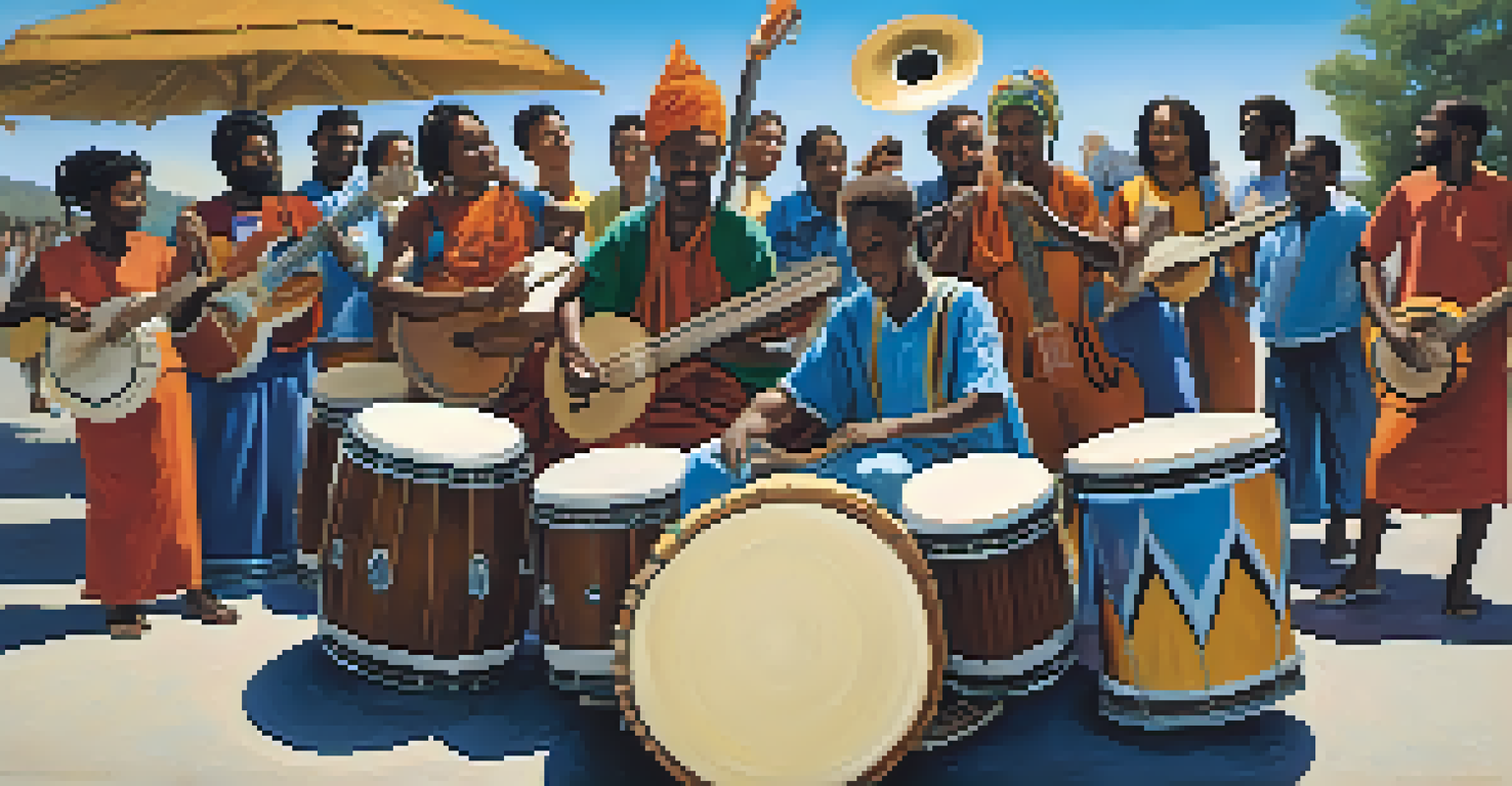The Role of Music in Religious Practices and Beliefs

The Historical Significance of Music in Religion
Throughout history, music has played a vital role in religious practices. Ancient civilizations, including the Egyptians and Greeks, used music to honor their gods and accompany rituals. This connection between music and spirituality has persisted into modern times, as many religions incorporate hymns, chants, and instrumental pieces into their ceremonies.
Music can change the world because it can change people.
Different cultures have unique musical traditions that reflect their beliefs and values. For instance, the use of drums in African tribal rituals often symbolizes communication with the spiritual world. Similarly, the Gregorian chants of medieval Christianity aimed to elevate the soul and create a serene atmosphere for worship.
As societies evolved, so did the role of music in religion, adapting to new beliefs and practices while retaining its core significance. Today, music remains a powerful tool for expressing faith, enhancing communal experiences, and fostering a sense of belonging among worshippers.
Music as a Form of Worship and Connection
For many believers, music serves as a direct line to the divine. Singing hymns or participating in musical worship can create a profound sense of connection with a higher power. This emotional experience often leads individuals to feel more engaged in their faith and community during services.

Consider the impact of gospel music within the African American church. The energetic rhythms and uplifting lyrics inspire congregants to express their emotions freely, fostering an atmosphere of joy and celebration. Such communal singing not only enhances personal spirituality but also strengthens the bonds among church members.
Music's Role in Spiritual Connection
Music serves as a profound means for individuals to connect with the divine and enhance their sense of community during religious services.
Music can also transcend language barriers, allowing people from diverse backgrounds to unite in worship. Whether through singing familiar songs or learning new spiritual melodies, shared musical experiences can deepen one’s faith and create a sense of belonging across different cultures.
The Therapeutic Effects of Sacred Music
Research has shown that music can have therapeutic benefits, especially in religious contexts. Sacred music, such as chanting or meditative tunes, can promote relaxation, reduce stress, and enhance emotional well-being. Many people find solace in these sounds during times of crisis or grief, allowing them to connect with their spirituality on a deeper level.
Where words fail, music speaks.
For instance, the practice of listening to calming music during prayer or meditation can help individuals focus their thoughts and foster a sense of peace. This can be particularly helpful in busy, chaotic lives where finding quiet moments for reflection is challenging.
Moreover, communal music-making—like singing in a choir or drumming in a circle—can build social connections and promote mental health. These activities cultivate a sense of community, support, and belonging, offering emotional and spiritual nourishment to participants.
The Role of Music in Rituals and Ceremonies
Music is often an integral part of religious rituals and ceremonies, marking significant life events such as births, weddings, and funerals. It adds a layer of meaning and emotion to these occasions, helping participants process their feelings and connect with the sacredness of the moment.
Take, for example, the use of traditional wedding songs across cultures. These songs often convey blessings, love, and hope, enhancing the spiritual significance of the union. Similarly, funeral hymns provide comfort and a sense of closure, helping mourners navigate their grief while honoring the deceased.
Therapeutic Benefits of Sacred Music
Sacred music promotes relaxation and emotional well-being, providing solace during times of crisis and fostering a deeper spiritual connection.
In many religions, specific musical pieces are reserved for particular ceremonies, creating a rich tapestry of sound that enriches the worship experience. This purposeful use of music not only enhances the atmosphere but also reinforces the community's shared beliefs and values.
Diversity of Musical Expressions in Faith
Religious music varies widely across cultures and faiths, reflecting the rich tapestry of human experience. From the intricate rhythms of Indian classical music used in Hindu worship to the harmonious melodies of choral music in Christianity, each tradition has its unique sound and style.
This diversity allows individuals to find a musical expression that resonates with their personal beliefs and cultural background. For example, the use of hip-hop in contemporary Christian music has attracted younger audiences and redefined traditional worship practices, making faith more accessible and relatable.
Moreover, interfaith collaborations often lead to the blending of musical styles, creating beautiful, innovative expressions of spirituality. Such collaborations not only enrich individual faith journeys but also foster understanding and appreciation among different religious communities.
Music as a Tool for Spiritual Education
Music plays an essential role in spiritual education, helping individuals learn and internalize religious teachings. Many faith traditions utilize songs, chants, and hymns to convey moral lessons, stories, and beliefs, making complex ideas easier to understand and remember.
For instance, children's religious songs often contain simple messages about love, kindness, and faith, instilling these values early on. The repetitive nature of music helps reinforce these lessons, allowing children to absorb the teachings in a fun and engaging way.
Diversity in Religious Musical Expression
Religious music varies widely across cultures, allowing individuals to find expressions of faith that resonate with their personal beliefs and backgrounds.
Additionally, music can serve as a bridge between generations, enabling elders to pass down their traditions and beliefs to younger members of the community. This sharing of musical heritage strengthens communal bonds and ensures the continuity of religious practices.
Challenges and Controversies Surrounding Religious Music
While music has the power to unite, it can also be a source of contention within religious communities. Disagreements over musical styles, instruments, and lyrics often arise, as some may feel that certain forms of music do not align with their beliefs or traditions.
For example, the debate over contemporary Christian music versus traditional hymns highlights differing opinions on what constitutes appropriate worship music. Some believe that modern styles dilute the sacredness of worship, while others argue that new music can invigorate and engage congregants in meaningful ways.

Navigating these challenges requires open-mindedness and a willingness to embrace diversity within religious practices. By fostering conversations about music and its role in worship, communities can create inclusive environments that honor various expressions of faith while still celebrating their shared beliefs.